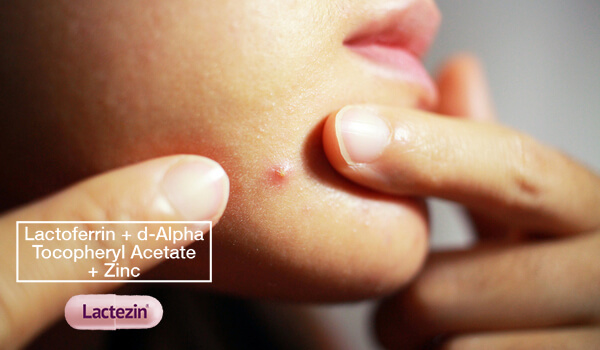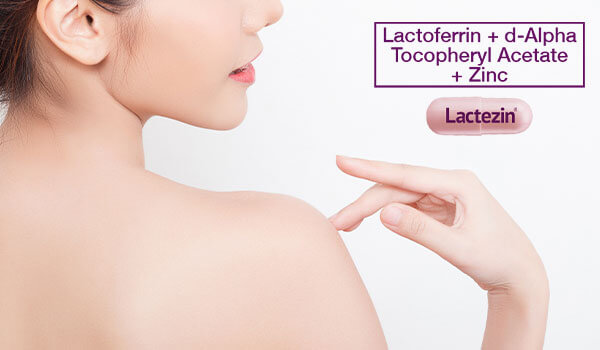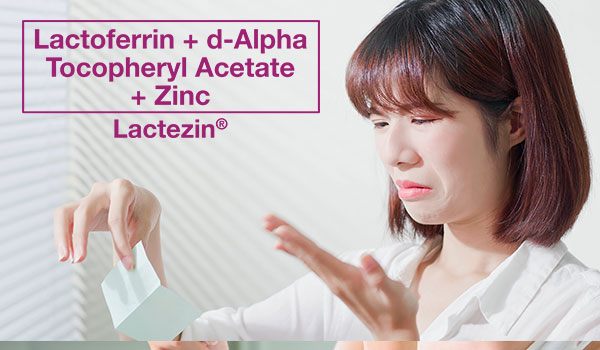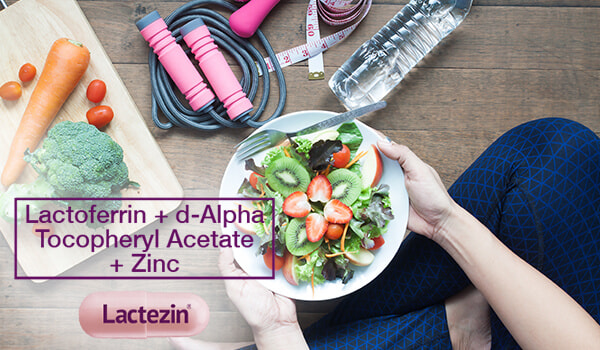Pimple on Chin? Effective Measures that Fight Maskne

Similar to acne on other parts of the face, pimples on the chin occur when pores are clogged with oil and dead skin cells. They may also appear after wearing face masks for too long. Learn more about pimples on the chin; what face mapping says, how maskne can be a likely cause, along with a list of ways to treat and prevent maskne.
Pimples on the Chin: What Face-Mapping Says
Traditionally known in China as mien shiang (“face reading”), face mapping is the practice of viewing the face as a map; that each section connects to different organs. The location of blemishes is thought to reveal organs that may have health issues.
Modernized with research and countless studies, face mapping has become helpful in terms of determining the likely causes of acne (aside from excess oil and dirt) on specific parts of the face.
- Acne on or near the hairline may be due to the use of pore-clogging hair products
- Acne on the cheeks may be intensified by dirty pillows
- Acne on the T-zone (forehead and nose) may be caused by too much stress, fatigue and touching your face
- Acne on the chin or the jawline is linked to hormonal imbalance and gut health
Pimples on the chin are very common. Hormones such as androgens stimulate or influence the production of sebum (oil). While breakouts are common among teenagers, hormone levels fluctuate throughout adulthood due to factors such as diet, and a woman’s monthly cycle.
How Pimples on the Chin Could Be Caused by Maskne
Wearing face masks is part of the New Normal. It has become an essential everyday detail to bring and wear a face mask, especially in public places such as markets and grocery stores. And if you notice your skin breaking out after wearing a mask too long or too frequently, know that you aren’t just making assumptions. It’s called “Maskne” which skin experts coined to refer to the common side effect of using a face mask.
Maskne (mask acne) is an umbrella term for skin conditions caused by wearing a face mask. These skin conditions include rosacea, contact dermatitis, folliculitis and acne. But how do masks cause breakouts? Here are three main ways how:
- Rubbing. Friction due to tightly-fitting masks causes irritation and could lead to acne. When constantly rubbed, the skin can become rough and may develop acne-like bumps.
- Irritation. Depending on its fabric or material, your mask may absorb the skin’s natural oils. This leaves our skin dry. Detergents and fabric softeners may also cause irritation and may trigger inflammation. The skin then appears red with dry patches, peeling or dark marks.
- Occlusion: Wearing masks traps your breath and makes the skin surface warm and moist, an environment that can lead to bacterial growth and pores getting clogged.
How to Treat and Prevent Maskne
Yes, acne and pimples on your chin may be caused by maskne. But wearing a face mask especially with the global threat of COVID-19 still looming around is a non-negotiable. It remains one of the best ways to protect yourself and your loved ones from contracting the virus. Rather than contemplating on whether to wear a mask or not, shift your focus on the other ways to manage maskne.
WAYS TO PREVENT MASKNE
- Skip the makeup. Forget putting on layers of makeup under your mask, as this can lead to clogged pores and breakouts.
- Make sure your mask is clean. Dirt and oil from your skin plus bacteria from your mouth and nose may pool on your mask’s cloth. You’ll want to have multiple masks on rotation, and to thoroughly wash each one after every use.
- Choose the right type of mask. To avoid skin issues, look for a mask that meets these points:
- made of a natural, soft fabric
- has two or more layers of fabric
- shouldn’t feel too tight when worn
- Never reuse surgical masks! Keep in mind that surgical masks are meant to be disposed after use. If surgical masks are your go-to, consider having several on hand.
- Consider applying antibiotic cream and moisturizer before wearing a mask. Topical antibiotic creams or gels help prevent bacteria buildup from wreaking havoc on your skin, while a good, non-comedogenic moisturizer can help keep your skin hydrated and protected from irritation.
WAYS TO TREAT MASKNE
- Keep with a good skincare routine. Make sure to cleanse thoroughly in the morning, at night and after sweating or wearing a mask. Stick to washing with lukewarm water and patting your skin dry to minimize irritation and friction.
- Use a gentle cleanser. Gentle products get rid of excess oil, sweat and bacteria without over-drying or irritating the skin. For maskne problems, consider using medicated cleansing formulas with benzoyl peroxide or salicylic acid.
- Switch to a non-comedogenic moisturizer. Products that are labeled ‘non-comedogenic’ are especially formulated to keep the skin hydrated without clogging or blocking its pores, and triggering breakouts.
Read more on preventing maskne: Before, During, After: How to Prevent and Treat Maskne at Home
Another great way to treat and prevent maskne is by pairing your good skincare habits with a supplement that targets the main causes of acne. Lactoferrin + d-Alpha Tocopheryl Acetate + Zinc (Lactezin) is an anti-acne drug that combines the pimple-fighting benefits of vitamin E with the antibacterial properties of lactoferrin and the oil-regulating effects of zinc. With regular use, Lactezin helps clear pimples in as early as 2 weeks.
Read more about pimple problems brought about by the pandemic. Lactoferrin + d-Alpha Tocopheryl Acetate + Zinc (Lactezin) is available in all leading drugstores nationwide. You may also purchase online through Lazada and Shopee.
SOURCES:
https://www.healthline.com/health/pimple-on-chin
https://www.healthline.com/health/beauty-skin-care/pimple-acne-face-map
https://www.goodrx.com/blog/tips-to-prevent-acne-caused-by-face-masks-maskne/


